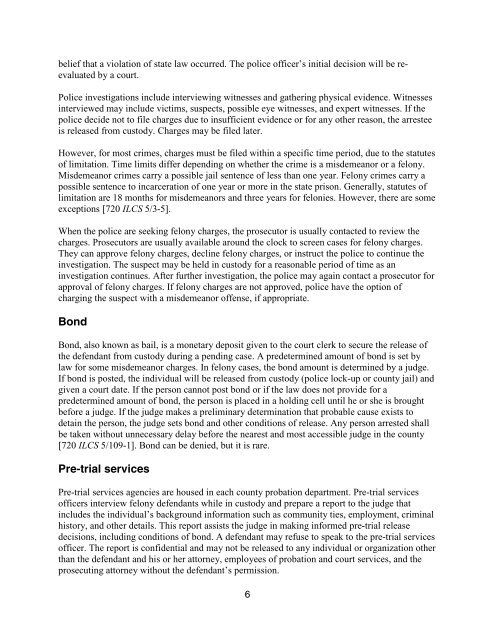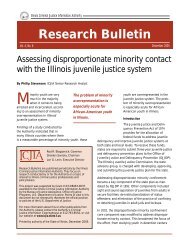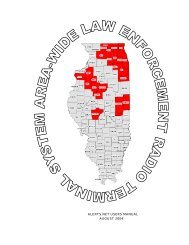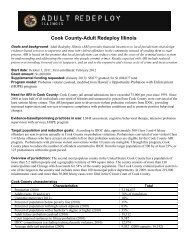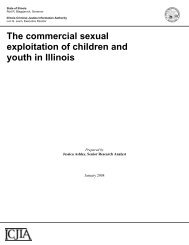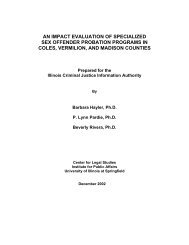policies and procedures of the illinois criminal justice system
policies and procedures of the illinois criminal justice system
policies and procedures of the illinois criminal justice system
You also want an ePaper? Increase the reach of your titles
YUMPU automatically turns print PDFs into web optimized ePapers that Google loves.
elief that a violation <strong>of</strong> state law occurred. The police <strong>of</strong>ficer’s initial decision will be reevaluated<br />
by a court.<br />
Police investigations include interviewing witnesses <strong>and</strong> ga<strong>the</strong>ring physical evidence. Witnesses<br />
interviewed may include victims, suspects, possible eye witnesses, <strong>and</strong> expert witnesses. If <strong>the</strong><br />
police decide not to file charges due to insufficient evidence or for any o<strong>the</strong>r reason, <strong>the</strong> arrestee<br />
is released from custody. Charges may be filed later.<br />
However, for most crimes, charges must be filed within a specific time period, due to <strong>the</strong> statutes<br />
<strong>of</strong> limitation. Time limits differ depending on whe<strong>the</strong>r <strong>the</strong> crime is a misdemeanor or a felony.<br />
Misdemeanor crimes carry a possible jail sentence <strong>of</strong> less than one year. Felony crimes carry a<br />
possible sentence to incarceration <strong>of</strong> one year or more in <strong>the</strong> state prison. Generally, statutes <strong>of</strong><br />
limitation are 18 months for misdemeanors <strong>and</strong> three years for felonies. However, <strong>the</strong>re are some<br />
exceptions [720 ILCS 5/3-5].<br />
When <strong>the</strong> police are seeking felony charges, <strong>the</strong> prosecutor is usually contacted to review <strong>the</strong><br />
charges. Prosecutors are usually available around <strong>the</strong> clock to screen cases for felony charges.<br />
They can approve felony charges, decline felony charges, or instruct <strong>the</strong> police to continue <strong>the</strong><br />
investigation. The suspect may be held in custody for a reasonable period <strong>of</strong> time as an<br />
investigation continues. After fur<strong>the</strong>r investigation, <strong>the</strong> police may again contact a prosecutor for<br />
approval <strong>of</strong> felony charges. If felony charges are not approved, police have <strong>the</strong> option <strong>of</strong><br />
charging <strong>the</strong> suspect with a misdemeanor <strong>of</strong>fense, if appropriate.<br />
Bond<br />
Bond, also known as bail, is a monetary deposit given to <strong>the</strong> court clerk to secure <strong>the</strong> release <strong>of</strong><br />
<strong>the</strong> defendant from custody during a pending case. A predetermined amount <strong>of</strong> bond is set by<br />
law for some misdemeanor charges. In felony cases, <strong>the</strong> bond amount is determined by a judge.<br />
If bond is posted, <strong>the</strong> individual will be released from custody (police lock-up or county jail) <strong>and</strong><br />
given a court date. If <strong>the</strong> person cannot post bond or if <strong>the</strong> law does not provide for a<br />
predetermined amount <strong>of</strong> bond, <strong>the</strong> person is placed in a holding cell until he or she is brought<br />
before a judge. If <strong>the</strong> judge makes a preliminary determination that probable cause exists to<br />
detain <strong>the</strong> person, <strong>the</strong> judge sets bond <strong>and</strong> o<strong>the</strong>r conditions <strong>of</strong> release. Any person arrested shall<br />
be taken without unnecessary delay before <strong>the</strong> nearest <strong>and</strong> most accessible judge in <strong>the</strong> county<br />
[720 ILCS 5/109-1]. Bond can be denied, but it is rare.<br />
Pre-trial services<br />
Pre-trial services agencies are housed in each county probation department. Pre-trial services<br />
<strong>of</strong>ficers interview felony defendants while in custody <strong>and</strong> prepare a report to <strong>the</strong> judge that<br />
includes <strong>the</strong> individual’s background information such as community ties, employment, <strong>criminal</strong><br />
history, <strong>and</strong> o<strong>the</strong>r details. This report assists <strong>the</strong> judge in making informed pre-trial release<br />
decisions, including conditions <strong>of</strong> bond. A defendant may refuse to speak to <strong>the</strong> pre-trial services<br />
<strong>of</strong>ficer. The report is confidential <strong>and</strong> may not be released to any individual or organization o<strong>the</strong>r<br />
than <strong>the</strong> defendant <strong>and</strong> his or her attorney, employees <strong>of</strong> probation <strong>and</strong> court services, <strong>and</strong> <strong>the</strong><br />
prosecuting attorney without <strong>the</strong> defendant’s permission.<br />
6


